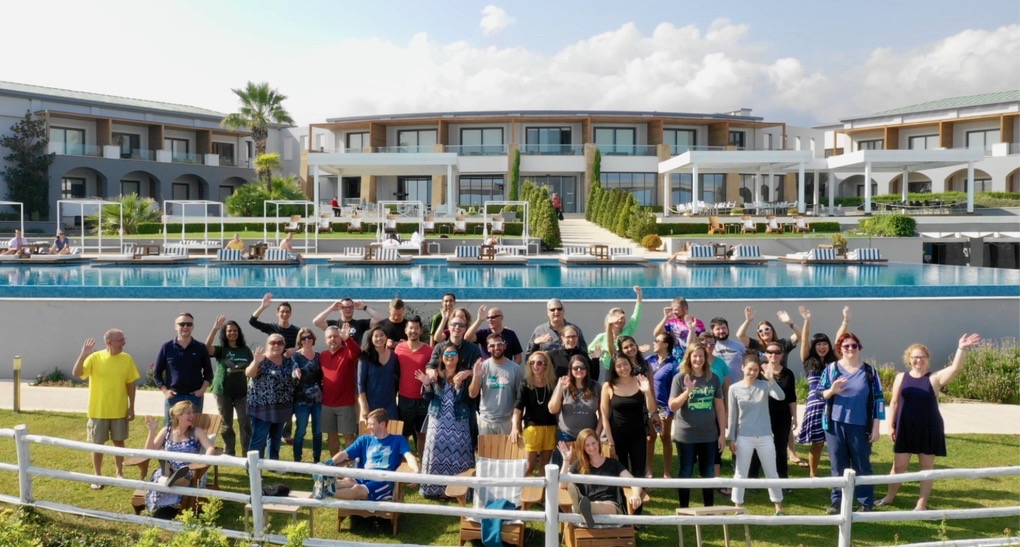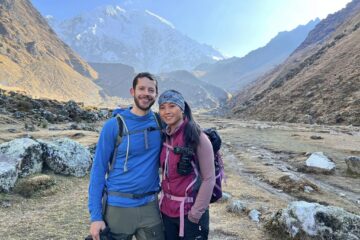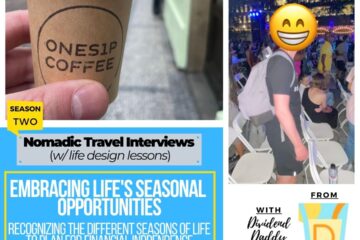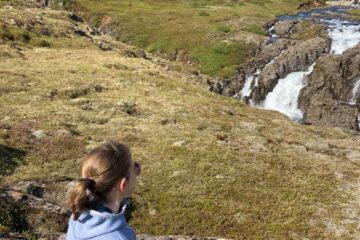
This interview is part of our interview series, where we curate stories of regular people that decided to design a life they love. (click here to learn more).
Kristy & Bryce from Millenial-Revolution.com
Some links to the products mentioned below are affiliate links, meaning that if you click and make a purchase, Nomad Numbers may receive a commission at no additional cost to you. For more information please review our disclaimer page.
These guys may not need much of an introduction because they are popular bloggers, featured in mainstream media and are now successful authors! They are also just fun and genuinely kind people.
We were excited to learn about Kristy and Bryce back in late 2016 through their blog at Milleniual-Revolution.com because they were doing what we wanted to do! Reaching financial independence and traveling the world. We had come across a lot of FI people and a lot of travel people but not a lot of people doing both. We read their cost of travel article and were blown away at what we read. These guys were traveling around the globe on less than 30K USD a year (like our first year of nomadic travel!) and they were planning on traveling for many years to come. We made the great decision to attend a FI retreat in Ecuador and were fortunate enough to meet Kristy & Bryce in person. It was a life changing week spent with our tribe and since then, they have become good friends!
At the time, I did not know Kristy & Bryce’s entire story but I was impressed by the fact that they became financially independent by 31! It turned out that Kristy had a rough childhood in rural China and lived in poverty for many years. She covers the series of events following her childhood in great detail in her fantastic book, Quit Like a Millionaire. Two decades later, she reached a net worth of a million dollars.
She is not only a rock star but a great example that anything is possible if you believe in yourself and have the appropriate financial know-how.
Let’s hear from Kristy!

Lifestyle change
What does a typical day in your life look like for you today? And how does it differ from your lifestyle before?
Kristy & Bryce (K&B): Every day is different. Sometimes we alternate between one day working on passion projects, and the next day sightseeing and meeting up with friends. That’s the beauty of this lifestyle. You never get bored and it feels like you’ve lived multiple lifetimes because everyday is filled with exciting adventures and seems to go on forever. My lifestyle before involved sitting in a cubicle for 8-12 hours a day, writing and debugging code. Most of my day was a blur and I had tons of health problems.
How did your daily agenda changed since you step away from your 9-5. What would you say is now the key factor driving the choice you are making daily? How has this change from before?
Check out the infographic below to contrast how Kristy & Bryce’s priorities have changed before and after their nomadic shift.

What led you to decide to change your lifestyle?
(K&B): One of my co-workers collapsed and almost died from overwork. He was working 14 hour days for years and the doctor said it was as bad as smoking 2 packs of cigarettes a day. I didn’t want to die at my desk from overwork.
What would you say is now the key factor driving the choice you are making daily? How has this change from before?
(K&B): Spending time with the people I love, doing the things I love doing. I feel more alive than I’ve ever felt before.
What were some of the biggest challenges to adjust to this new lifestyle?
(K&B): You need to be comfortable with constant change, which is what happens when you travel the world. Sometimes things don’t go according to plan, sometimes you miss a flight or get lost. That’s okay. It makes life more interesting.
What life philosophy has been guiding you through this journey?
(K&B): Spend your time wisely and with purpose. Don’t just follow the herd.
As you’ve been spending more time together while traveling, were there any challenges with spending 24/7 with your spouse? Was there any adjustment you made to your schedule to keep a healthy balance
(K&B): Since Bryce and I were lab partners in university we were pretty used to hanging around each other 24/7. Though, the thing to remember for couples is that travel does add an extra level of stress. Through trial and error, we came up with a system called “Trust but Verify” that Bryce wrote about here
What did your friends and family think of your plan to take on early retirement? What did they think when you announced to them that you will be quitting your day to day job and starting to travel?
(K&B): When we first started traveling the world, my dad sent me an e-mail every month with a list of jobs. He kept saying “you need to stop wasting time and go back to work. You don’t have enough money.” It took him 3 years to finally understand this lifestyle.
Our friends were mostly supportive, though most of them thought we were just taking a gap year. A lot of them reached out to us after our interview with CBC went live (a year after we retired) and offered to take us out for coffee to pick our brains about investing and early retirement.
Since you no longer have to go to “the office” to receive income, has the definition of “work” changed for you and can you explain what “work” project you are focusing on at the moment?
(K&B): I no longer work to live. This means I can choose to work rather than be forced to work. Work now means focusing on passion projects that feed my soul instead of my wallet.
Travel

How would you describe your travel style?
(K&B): Slow travel. We like to split our time between 4 continents (North American in the summer, Europe in Spring and Fall, South East Asia in the winter), spending 3 months in each, visiting friends and taking on passion projects.
If you could never travel again and could pick any city to be confined to, where would you pick? And why?
(K&B): Ooh that’s a hard one. Hmm… I would say Chiang Mai. It just feels like home. Plus, you can’t go wrong with daily 2 hour massages, am I right?
How much stuff do you travel with?
(K&B): Two 40L Osprey backpacks (the Fairview 40 Women’s for myself and the Farpoint 40 Men’s for my hubby), a purse (for me), and a laptop bag (for my hubby). Everything we own is carry-on.
What’s something you pack that’s not absolutely essential but you like having it?
(K&B): This hair straightener. I didn’t used to carry it, but now that we’ve been invited to speaking engagements and TV appearance, I’m trying to retire my “hobo-chic” look.
Spending

How much money do you spend on travel per year? How many days of travel does this represent? How much does this represent per day and per person?
(K&B): Around $30K/year USD for the 2 of us. This is for 365 days, so around $40 USD per person and per day.
Spending per region
The table below provides a breakdown of a full year of travel per the continent that Kristy & Brice visited during this period. (You can find more details about their first year on travel on their cost of traveling the world for a year article).
| Region | Duration | Monthly Cost (USD) |
| North America | 1 month | $2,441 |
| UK | 1 month | $3,962 |
| Western Europe | 1 month | $3,515 |
| Eastern Europe | 1 month | $2,657 |
| Asia | 2 months | $5,619 (or $2809 / month) |
| Southeast Asia | 6 months | $11,339 (or $1890 / month) |
| Total | 12 months | $29,533 |
During our first year of travel we visited the following 20 countries (in chronological order)
- USA: Boston
- England: London, Bristol
- Scotland: Glasgow
- Ireland: Dublin
- Netherlands
- Denmark: Copenhagen
- Belgium: Brussels
- Germany: Cologne, Frankfurt, Stuttgart, Munich, Neuschwanstein
- Switzerland: Swiss Alps
- Austria: Vienna
- Czech Republic: Prague
- Hungary: Budapest
- Greece: Santorini
- Japan: Tokyo, Osaka, Nara
- South Korea: Seoul
- Singapore
- Thailand: Chiang Mai, Bangkok, Thai Islands (Nang Cave, Phra Nang, Koh Lanta)
- Vietnam: Nha Trang, Hue, Cat Ba
- Malaysia: Kuala Lumpur, Langkawi
- Cambodia

How do you fund your travel (savings/work whilst travelling/other)?
(K&B): With the passive income from our investment portfolio.
How long did it take you to become financially free? Why did you decide to reach financial freedom? What were some of the challenges you had to face along the way?
(K&B): It took us 9 years to become FI. I decided to become FI because I grew up poor and I never wanted to worry about money ever again. Learning how to invest was a huge challenge to me because as an immigrant, who was born in rural China, every single penny was precious. Putting it into the stock market was terrifying.
Community

How do you meet people when you travel? Do you have any tips for people that are having challenges meeting people while traveling?
(K&B): Through Airbnb, local meet-ups, financial retreats (specifically the FI Chautauquas) and digital nomad conferences.
(K&B): Definitely. As a result of the blog, we got invited by the Godfather of FI, Jim Collins, to speak at the Chautauqua, an annual FI retreat. We love the Chautauquas and it’s where we met most of our friends that we see all over the world. Our best friends, Alan & Katie, also run the event.
(K&B): Most of our friends are now from the FIRE (specifically Chautauqua events) community now and this will continue into the future. We now have mini reunions all over the world–many of our friends have come to visit us in Thailand, Spain, Portugal, and Toronto. We also stay in touch on Skype. It’s been a blast. Going forward, we will continue speaking at the Chautauqua retreats as it’s one of our favourite things and we look forward to it every year. This will also enable us to continue adding to our Chautauqua family (ha! Now it really does sound like a cult!) and keep in touch with them through travel. We’re also thinking of staying 3 months of the year in Thailand, so that we can continue building our community with expats, digital nomads, in addition to the FIRE community.
Last but not least
What is one resource (blog, podcast, book besides your own) you recommend for those that want to pursue your lifestyle?
(K&B): Your blog 🙂
What advice do you have for others who are considering this type of lifestyle?
(K&B): Go slow. Don’t try to see everything or you’ll need a vacation from the permanent vacation.
Tell us one belief that is held up by society as ‘common sense’ but that you disagree with and why.
(K&B): The standard narrative: Get a job, buy a house, work until you’re 65, retire with a pension. I don’t know about you, but as a millennial, I can’t work for one company for 30 years and expect to be taken care of by a pension. Jobs like that no longer exist. Houses are also unaffordable and guess what? It makes no sense to get a 30 year mortgage when you don’t know if you’ll even have a job in the next 5 years. That’s why we started our blog, the Millennial Revolution, and wrote Quit Like a Millionaire to teach readers about the new rule-book of money.
Rapid Fire Questions
| What is your favorite travel destination & why? | Chiang Mai, because it feels like home. |
| What was the most creative thing you’ve ever done to save money during your travels? | Travel during shoulder/low season. That’s how you avoid the crowds and get steep discounts. |
| What was your biggest travel mistake? | Going to a seafood restaurant recommended by our Airbnb host in Madrid. We got food poisoning and couldn’t get out of bed for 2 days. |
Thank you Kristy & Bryce for sharing your incredible and inspiring story!

If you want to know more about Kristy & Bryce, you can find them on the following platforms:
- Blog: https://www.millennial-revolution.com/
- Facebook: Millenial Revolution
- Twitter: @FIRECracker_Rev
- Instagram: @Firecracker.revolution
They also recently released “Quit like a Millionaire”, a fantastic book that we’ve highly recommend as our go to book for people that want an introduction to the concept of financial independence. Whether your want to become a nomadic traveler or simply want to live your passion without having to worry about the financial aspect of life, this book will be life changing!
The Bottom Line
Here are the main lessons we took away from this interview:
- Lesson 1 – “The standard narrative: Get a job, buy a house, work until you’re 65, retire with a pension” is broken – A LOT of people still believe that attending an expensive school, getting a job, buying a house, working until they are 65 (if they don’t die before) and collecting a pension is the only way to be successful in life. The truth is, when you stop focusing your actions based on what society or other people expect from you and refocus your energy on yourself and what makes you happy, you then realize that this narrative is totally broken. At its core it is based on ongoing and increasing consumerism (lifestyle inflation though earning a good salary) so that you can impress people with the stuff you can buy (house, swimming pool, luxury cars…) at the cost of having no time for yourself. Instead we highly encourage people to value their time more than their money as this will ultimately let them move from a scarcity mindset (I have little control over my time) to an abundance mindset (I can choose how I spend my time).
- Lesson 2 – “Go slow” – Kristy & Bryce are similar to us in their travel philosophy as they slow travel and this is why they have been able to travel for more than 4 years! Traveling the world is a beautiful thing but it can quickly become tiring. We actually believe that slow travel gives you a better travel experience.
- Lesson 3 – “I no longer work to live. This means I can choose to work rather than be forced to work. Work now means focusing on passion projects that feed my soul instead of my wallet.” – Once you become financially free, the world becomes your own playground where you can leverage the enormous amount of time you have for yourself and focus on what you like most. This lifestyle makes a lot of sense once you are able to rethink what life can be outside of society’s expectations.
Call to action
What do you think about this story? We would love to hear from you, so feel free to share your feedback by leaving a comment below.
Sometimes we need to hear about others making unconventional decisions before we can have the confidence to make our own. If you have(or are on a path to) an unconventional journey to improve your life that has a travel component to it and are interested to share it, please reach out to us as we would love to feature your story.



5 Comments
Skip · December 16, 2019 at 12:16 pm
Another great interview.
I have been reading Millennial Revolution for some time now, so most of this information is familiar to me. However, I do have a couple of travel related questions:
“We like to split our time between 4 continents (North American in the summer, Europe in Spring and Fall, South East Asia in the winter), spending 3 months in each”
I’m wondering what this itinerary is based on… Chasing the nice weather, corresponding with the low season, something else? This is great information as we put our own itinerary together.
“Two 40L Osprey backpacks (the Fairview 40 Women’s for myself and the Farpoint 40 Men’s for my hubby), a purse (for me), and a laptop bag (for my hubby). Everything we own is carry-on.”
This is a goal of ours. We are considering the same, but also considering one checked bag between the two of us. Did you start out carry on only, or did this develop over time?
Thanks for the great content.
FIRECracker · December 19, 2019 at 5:31 pm
Hi SKIP,
Thanks so much for reading MR and great questions. In terms of how we decided on slow travel itinerary, it’s mostly based on weather and community. Since we’ve been travelling for nearly 5 years now, the focus is no longer on sight seeing and discovering as many places as possible. It’s more about visiting our communities around the world–while optimizing for weather 😉 We have friends in Europe as a result of the Chautauquas, that’s why we keep going back. Summer is reserved for friend and family back in Canada and the US (we hate snow so we avoid it like the plague!) and SE Asia has an expat/ digital nomad community we go back to visit. It also has the perfect temperature during the months of Nov-early Feb.
In terms of luggage, we started with just carry on (I hate waiting in lines to check in luggage and I don’t want to pay extra to check it in). But our bags were fuller and we had to send stuff home during the first year. So what we keep in our bags has been refined over time. Don’t worry if you don’t get right in the beginning. It’s a learning process 🙂
Michelle @ FrugalityandFreedom · January 16, 2020 at 5:38 am
Great interview! I love your writing and hope to cross paths with you somewhere in the world soon.
I’m still in touch with the FIRE folk I met attending Chautauqua in Ecuador 2016, plus have built a bunch of other friends from the community via FinCon and meetups. I agree that it can be tricky as a nomad to develop deep connections when you may not be in a city for long, so I find it’s great to have friendships in this “FIRE tribe” that can be maintained online in between visits.
Firecracker · January 16, 2020 at 10:53 am
Good to hear from a fellow Chautauquan and thanks for the kind words! Yeah I think that’s why we need our FIRE community more than ever. No one really understands this lifestyle back home but the Chautauquans get it.
What we learned from interviewing nomadic travelers - Nomad Numbers · May 16, 2020 at 5:06 am
[…] “The standard narrative: Get a job, buy a house, work until you’re 65, retire with a pension.” – Krysty & Brice […]